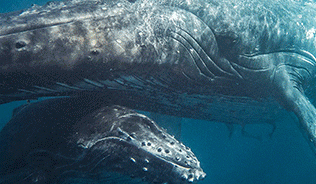2021 has been an eventful year for the IES in which we have delivered an ambitious programme of activities across our membership services. We are proud to have been championing the concept of transformative change, recognising that incremental changes will not get us to a sustainable society quickly enough to deal with the urgency of environmental pressures. Alongside this, we have been working towards a truly inclusive and diverse environmental workforce and a just transition – both of which we strongly believe will be essential in addressing the environmental challenges facing society.
Despite the continued challenges posed by the COVID-19 pandemic, we were pleased to have been able to, once again, engage with members face-to-face with the launch of hybrid events and to see a record number of members involved in the work of our communities this year.
We are extremely grateful to everyone who has contributed to our work over the past year, and we wish you all season's greetings and all the best for a prosperous 2022.
Championing transformative change
Our work on transformative change addresses the interlinking challenges of climate change, biodiversity loss, soil depletion, deepening inequality and public health issues that are facing society. With the release of our strategy for 2021-2024, guiding transformative change has become more than an intellectual exercise, but is now also one of our core purposes. As we continue to give our members the tools to realise and deal with transformative change, we have also begun the process of helping the wider public to visualise what that transformative change might mean for their lives.
Towards the end of the year, we& released our Manifesto for Transformative Change which sets out 54 recommendations for achieving transformative change through global climate action. Throughout 2021, we have also worked to address transformative change across contexts, including environmental governance, nature, the recovery from COVID-19 and helping the environmental profession to become more sustainable, more skilled and more diverse. As we move into 2022, we will continue to embed this concept across more of our membership services.
Building a truly diverse and inclusive sector
A diverse and inclusive workforce is essential n ensuring hat the profession is equipped to address the significant environmental challenges we, as a society, are facing. We believe that professional bodies should be leading the way in ensuring that barriers to entering their sectors are addressed and recognise our responsibility to promote programmes and initiatives that enhance diversity and inclusivity in the environment sector.
Over the past year, we have undertaken a research project to explore the opportunities and challenges related to ethnic diversity within the sector. The research addresses three key themes: better understanding the underlying causes of low ethnic diversity within the sector, inspiring greater awareness of diversity initiatives and opportunities for inclusion, and enabling more individuals from all ethnicities to access, progress and excel in environmental professions.
The findings of this research will be published as a report in the new year and will include recommendations for employers and individuals to establish positive change across the sector.
Some further highlights from the year include:
- In our STAGES on the Road to COP26 series, we produced half a dozen briefings, held more than 20 events and collaborated with countless organisations and environmental professionals. Staff were also present at COP26 where they attended negotiations and met with stakeholders;
- We released a report on Climate Change and Local Government and announced a project to improve knowledge sharing on climate change at local levels, including the launch of our TALK Board;
- 2021 saw our highest ever membership retention rates, signalling the strong relationship that we enjoy with our members;
- We met regularly with Government departments, particularly on soils and environmental governance, and were quoted in a report by Parliament’s Environmental Audit Committee on embedding ‘just transition’ in a green recovery from COVID-19;
- In our quarterly journal, environmental SCIENTIST, we explored a broad range of topics within the areas of ocean science, air quality, animal migration and climate action;
-
We shared the experiences of members to mark commemorative dates including LGBT+ History Month and International Day of Women and Girls in Science;
-
Our biennial Salary and Workplace Satisfaction Report examined trends in pay and job satisfaction across the sector;
-
We held a record number of community-led activities, delivering over 50 events, including webinars, forums and community debates, tailored to the interests and expertise of our IES Communities;
-
IAQM published new guidance on the assessment, monitoring, modelling and mitigation of indoor air quality which was referenced in the UK Parliament by Geraint Davies MP, Chair of the All-Party Parliamentary Group on Air Pollution;
-
Throughout the year, we hosted and recorded nearly 50 webinars which were attended by over 3,000 industry professionals from across the sector;
-
In February, we welcomed over 70 virtual delegates to the online DMUG 2021 conference and later in the year we delivered several hybrid events – offering both in person and virtual attendance to delegates – including Routes to Clean Air 2021, held in Bristol, UK, and the Land Condition Symposium 2021 in Manchester, UK; and
-
In December 2021, we hosted and livestreamed our flagship event, the Burntwood Lecture 2021, presented by Professor Joann Haigh. The lecture examined the definition and implications of net zero and took a timely look at what was agreed at COP26.



